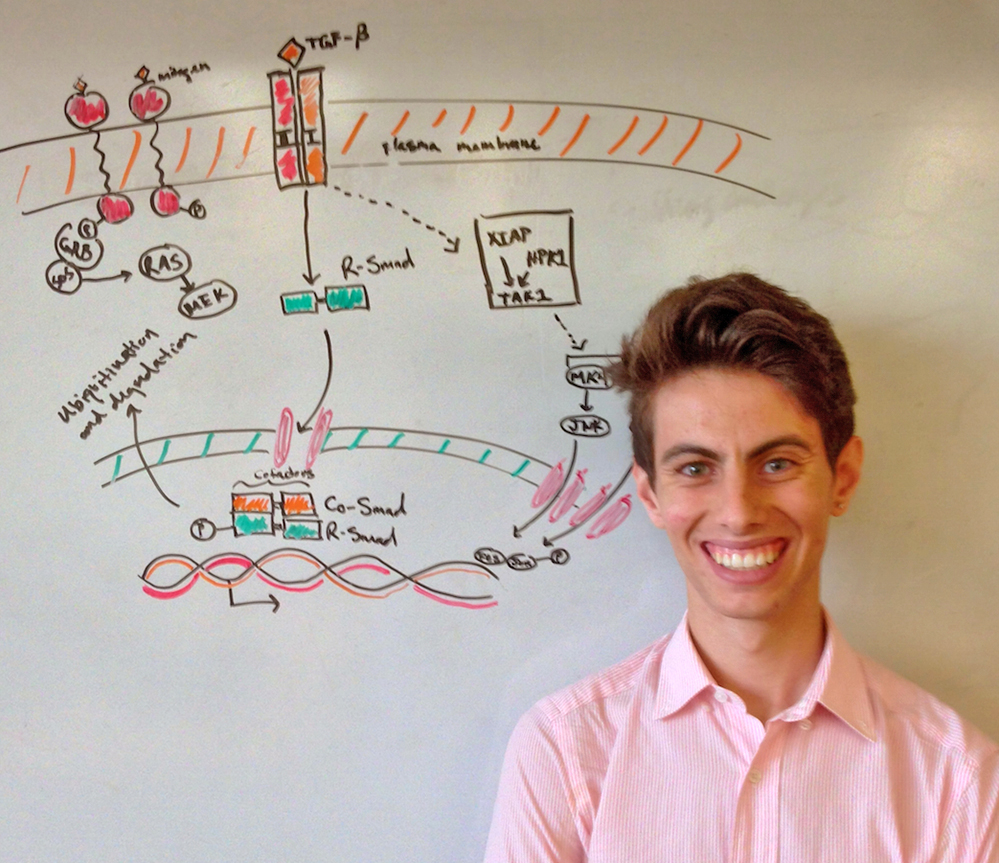Harvey Mudd Students Earn Prestigious Summer Internships
August 6, 2014
Creative thinking, data analysis and hands-on research are all in a day’s work for Max Frenkel ’16, a joint chemistry and biology major at Harvey Mudd and an intern at the Harvard Stem Cell Institute (HSCI). He is spending 10 weeks in the Massachusetts General Hospital laboratory of HSCI Principal Faculty member Dr. Alan Mullen, known for his research on the TGF-beta signaling pathway, which regulates normal development, wound healing and liver fibrosis.
“Max was a natural to be selected for this internship and I was thrilled to see him get it,” said Robert Cave, professor of chemistry. “He is naturally curious and is tenacious in his desire to understand things at a deep level. While he showed interest in many different areas of chemistry last year, I know his passion lies in stem cell research, and I can’t think of a student whose ability and drive better position him to make great contributions to the area.”
Frenkel is part of a sizable group of Mudders accepted to prestigious summer internships, which include the Undergraduate Research in Applied Mathematics program at University of California, Merced, the biodiversity program at the California Academy of Science, San Francisco, and the Summer Research Program in Genomics at the MIT/Harvard Broad Institute, to name a few. Harvey Mudd encourages such opportunities as part of its commitment to real-world experiences that help transform students into passionate problem solvers and professionals.
The following HSCI news release about Frenkel’s internship offers more detail about his collaborative research.
HSCI, Cambridge, MA – Max Frenkel, a junior at Harvey Mudd College, is one of 40 undergraduate students accepted into the 2014 Harvard Stem Cell Institute (HSCI) Internship Program, which provides participants with a challenging summer research experience in a cutting-edge stem cell science laboratory.
Frenkel is spending 10 weeks, from June 9 to Aug. 15, in the Massachusetts General Hospital laboratory of HSCI Principal Faculty member Alan Mullen, MD, PhD, known for his research on the TGF-beta signaling pathway, which regulates normal development, wound healing, and liver fibrosis. Frenkel’s project this summer is to better understand the molecular players that regulate the TGF-beta signaling pathway in endodermal cells—which go on to become lung, thyroid, and pancreatic cells—and explore techniques for how this pathway might be controlled.
“The bulk of my effort so far has been fine tuning new procedures along with designing constructs to genetically modify stem cell lines to be used in future studies,” Frenkel said. “This troubleshooting framework of experimentation requires me to think creatively on a daily basis.”
“The internship has taught me about my particular propensities for believing or disbelieving certain types of data,” he added. “I’ve learned about ways I can strengthen my data in the face of adversity, and, possibly more importantly, ways I can falsify my own data by examining it from a different perspective or considering new, clever controls.”
Over the course of the program, interns participate in a stem cell seminar series, a career pathways presentation, and a weekly stem cell companion course. They present their summer research findings, both orally and in poster format, at an end-of-program symposium.
“This program represents an exciting opportunity for undergraduates to gain hands-on experience in stem cell research while working in an HSCI laboratory under the supervision of an experienced researcher,” said HSCI Internship Program co-director M. William Lensch, PhD.
The Harvard Stem Cell Institute gratefully acknowledges the generous support of the following sponsors for the 2014 HSCI Internship Program: Biogen Idec, Boehringer Ingelheim Pharmaceuticals Inc., EPSRC Centre for Innovative Manufacturing in Regenerative Medicine, Loughborough University (UK), Novartis Institutes for BioMedical Research, and Vertex Pharmaceuticals.
